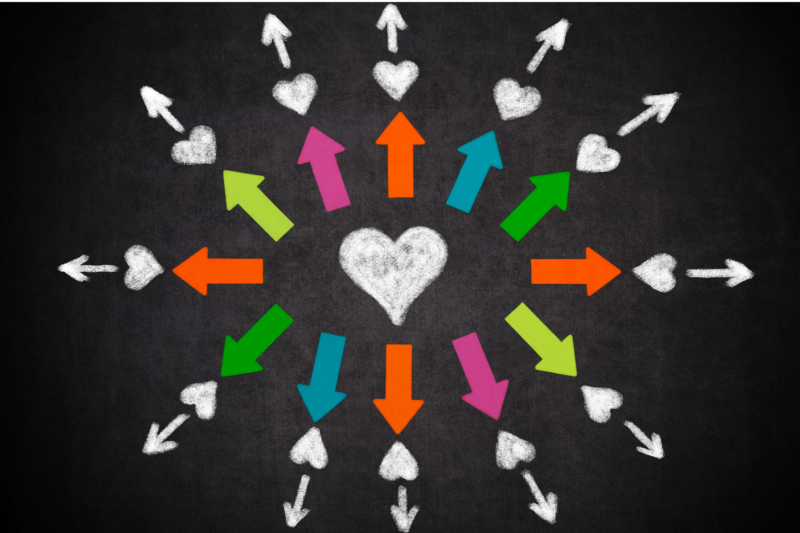
I talk and write a lot about self-compassion because, contrary to all-too-common belief, self-compassion isn’t fluffy, or self-pitying, or self-indulgent. Self-compassion is essential to mental and emotional well-being, and by virtue of the role it can play in help us form and maintain habits, it can also support physical well-being.
Two things I see friends, family, clients, and people at large frequently get wrong about self-compassion are that:
- They aren’t worthy of self-compassion because there are other people who are suffering or struggling more than they are. (“Sure, what happened to me was bad, but other people have it worse.”) Or,
- Because they are suffering or struggling, pointing out that other people objectively have it worse somehow negates their own pain. (“Hey, thin people struggle with weight stigma, too, so it’s not fair to say that fat people have it worse.”)
Note: I always use the word “fat” as a neutral descriptor, similar to the words, thin, short, tall, Canadian, brown-eyed.
The truth is that everyone suffers at one time or another, in one way or another, in ways big and small, because suffering is part of the human condition. These two things are true at the same time:
- When you are suffering or struggling, that pain is real.
- While it is important (and truthful, and kind) to acknowledge that some people will experience more suffering (“have it worse”) in their lives than you will, that doesn’t erase or invalidate your own suffering.
Self-compassion (and compassion) are infinite resources. You don’t need to fight for your slice of the compassion pie AND you don’t need to deny yourself compassion because someone “deserves it more.”
The more we practice the three parts of self-compassion — mindfulness, self-kindness and common humanity — the more compassionate we also become towards others. It’s a win-win, not a zero sum game.

Looking beyond “other people have it worse”
I can’t even tell you how many people I know who are deeply compassionate towards other people, but can’t spare an ounce of compassion for themselves.
The reason? You guessed it: “Because other people have it worse.” As if to be a truly giving, caring, person, you can’t have needs yourself — or if you do have them, you shouldn’t acknowledge them.
Sometimes, there’s shame piggybacking on this, a feeling of lack of worth that translates to “I’m not worthy of compassion” and “My pain is insignificant…because I’m insignificant.”
When I’m working with clients and we connect the dots between childhood events and current adult challenges with food and body image, and I bring up self-compassion, I often encounter some initial dismissal of “how bad” their experiences were. This is true whether those early life experiences involved abuse and neglect or the manifestations of diet culture. If we’re talking about diet culture, this may have involved parents or other family members who did any or all of the following:
- Chronically dieted and/or criticized their own bodies
- Criticized my client’s body
- Put my client on a diet or monitored their weight
- Praised one child’s thin body while criticizing or “worrying about” their fat sibling
- Allowed thinner siblings to eat more than fatter siblings
- Openly commented on (or even harshly criticized) the fat bodies of strangers
The excuses are many. If their parents dieted and criticized their own bodies, I often hear, “Well, at least they didn’t put ME on a diet, it could have been worse.” If the parent regularly displayed anti-fat bias towards others, then it’s “Well, they never criticized MY body, so it could have been worse.” I also hear, “Yes, I wish I hadn’t started dieting at age 8, but at least I never developed an eating disorder.”
Yes, objectively it’s worse to develop a clinical eating disorder (which can be fatal) than to spend endless time, money and energy dieting…but the pain of being on the yo-yo diet hamster wheel for years or even decades is still real.
Yes, objectively it’s more painful to have your parent criticize your body than it is to hear them criticize a stranger’s body…but there is still pain in wondering what your parent thinks about YOUR body (and suspecting that you know what they’re thinking), even if they aren’t verbalizing it.

Weight stigma does not affect everyone equally
Diet culture and anti-fat bias (aka weight stigma) are kissing cousins, and it’s an unfortunate fact that living in an anti-fat culture means that people across the weight spectrum are vulnerable to weight stigma and bias.
For thinner people, most of this stigma will be internalized (directed towards yourself), either because of feeling that they need to “just lose those last five pounds” or because they fear being criticized if they ever gain weight.
For fatter people, this stigma might be internalized (unless they’ve cultivated body appreciation and respect), but it will also come from countless external sources — doctors, co-workers, employers, strangers — as well as systems and institutions. Think barriers to certain surgeries or treatments, theater seats that pinch, flimsy café chairs, clothing companies that can’t be bothered to produce a truly inclusive range of sizes, gyms that assume you’re working out to lose weight rather than simply to be strong.
Thin privilege is real, and no matter how dissatisfied you are by your body, if you are at least relatively thin you will be able to navigate this world with fewer hassles, if any.* You can move through this world confident that your body will physically fit where it needs to fit, that you can walk into pretty much any store and find something to wear, and that your intelligence and competence and health habits will not be called into question because of your body size.
So everyone who struggles with internalized weight stigma and body dissatisfaction is worthy of compassion, even if the weight of anti-fat oppression is heightened at higher weights.
*If you are thin and have a physical disability or are neurodivergent, then this world will present you with some challenges and obstacles, because it’s set up for people who are able-bodied and neurotypical. But your challenges won’t be the same as they will be for someone who is fat AND disabled and/or neurodivergent. That’s intersectionality at work.

Meeting everyone where they’re at
After reading that last section, if you think the solution to external and institutional anti-fat bias is to “just lose weight,” I want to stop you RIGHT THERE.
Placing the burden of systemic discrimination and oppression on the people experiencing the discrimination and oppression is wrong and f*cked up, across the board. It doesn’t matter if you’re talking about discrimination and oppression based on weight, skin color, religion, gender, ability or whatnot.
Remember how I said that compassion is a limitless resource? Showing one person compassion doesn’t mean you have to show less to someone else to balance things out. It doesn’t mean you have to show less compassion to yourself, either.
If someone is struggling or suffering, whether it’s at their own hand or someone else’s, they deserve compassion, period. They don’t deserve to be told it’s their own fault for being in the “wrong” body. They don’t deserve to be told that other people have it worse. And if they are someone who objectively has it worse than most people struggling with something similar — weight stigma — in this case, they don’t deserve to have someone with more privilege say, “Hey, I struggle, too!”
When we show compassion for, and perhaps even fight for, someone who is enduring more stigma, oppression and discrimination than we are, everyone wins, because a rising tide lifts all boats.
Self-compassion resources
Here are some key resources for learning more about self-compassion:
- “Self-Compassion: The Proven Power of Being Kind to Yourself” by Kristen Neff
- “Fierce Self-Compassion: How Women Can Harness Kindness to Speak Up, Claim Their Power, and Thrive” by Kristen Neff
- “The Mindful Path to Self-Compassion: Freeing Yourself from Destructive Thoughts and Emotions” by Cristopher Germer
- “The Mindful Self-Compassion Workbook: A Proven Way to Accept Yourself, Build Inner Strength, and Thrive” by Kristen Neff and Christopher Germer
This post contains Amazon Affiliate links. As an Amazon Associate I earn from qualifying purchases.
Disclaimer: All information provided here is of a general nature and is furnished only for educational purposes. This information is not to be taken as medical or other health advice pertaining to an individual’s specific health or medical condition. You agree that the use of this information is at your own risk.
Hi, I’m Carrie Dennett, MPH, RDN, a weight-inclusive registered dietitian, nutrition therapist and body image counselor. I offer compassionate, individualized care for adults of all ages, shapes, sizes and genders who want to break free from eating disorders, disordered eating or chronic dieting. If you need to learn how to manage IBS symptoms with food, or improve your nutrition and lifestyle habits to help manage a current health concern or simply support your overall health and well-being, I help people with that, too.
Need 1-on-1 help for your nutrition, eating, or body image concerns? Schedule a free 20-minute Discovery Call to talk about how I can help you and explore if we’re a good fit! I’m in-network with Regence BCBS, FirstChoice Health and Providence Health Plan, and can bill Blue Cross and/or Blue Shield insurances in many states. If I don’t take your insurance, I can help you seek reimbursement on your own. To learn more, explore my insurance and services areas page.
 Print This Post
Print This Post






